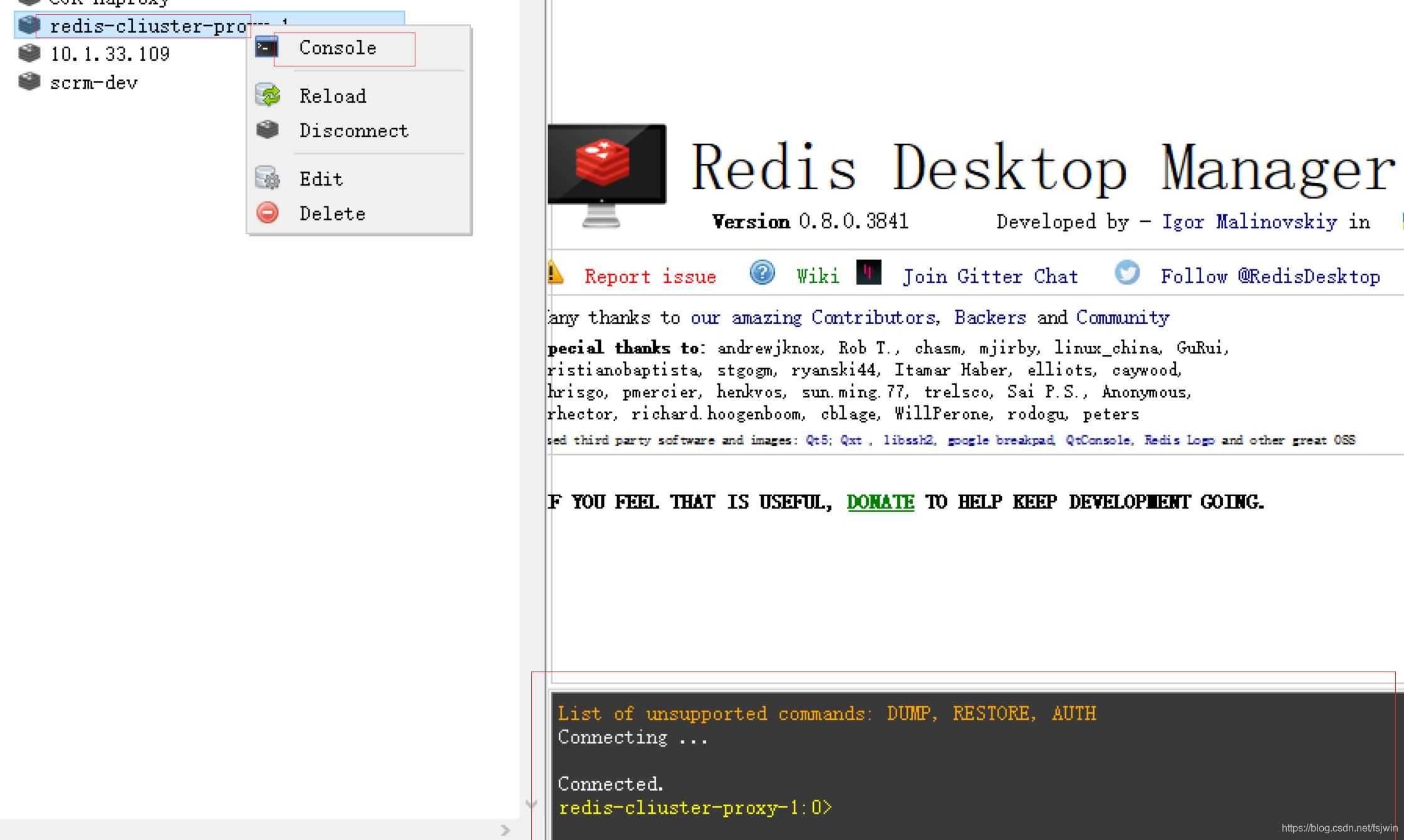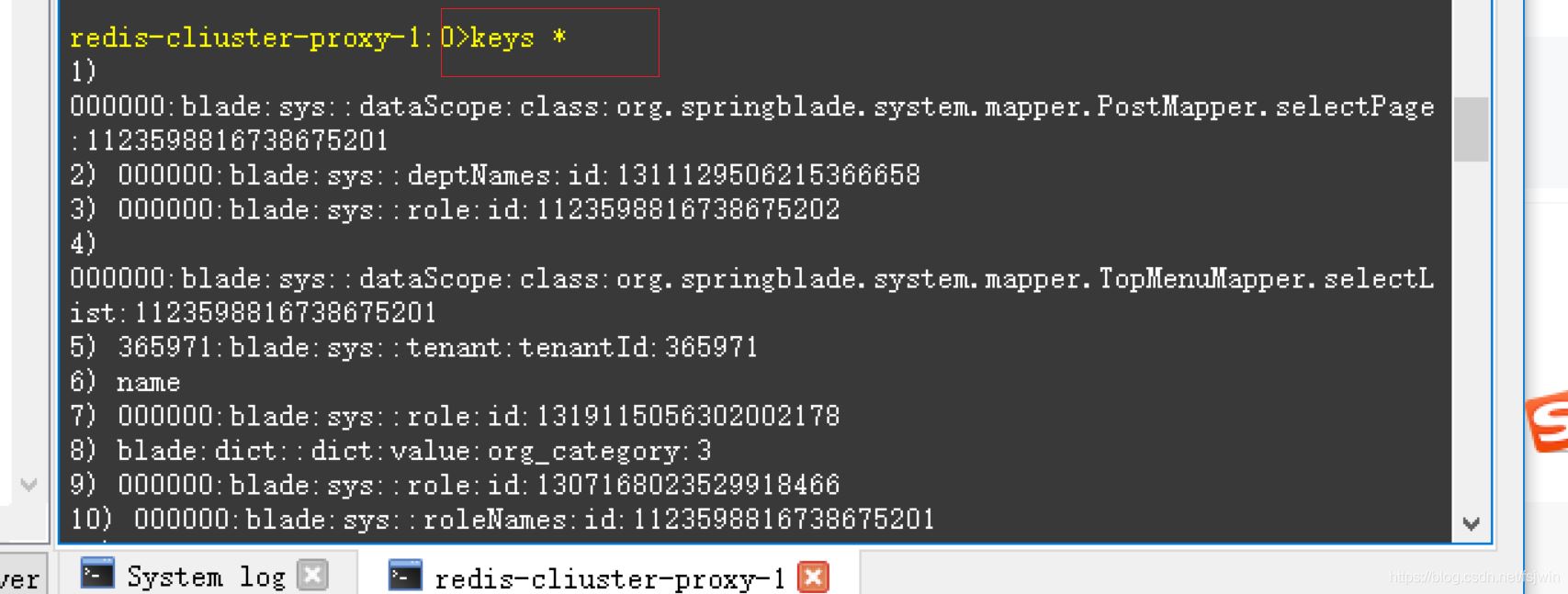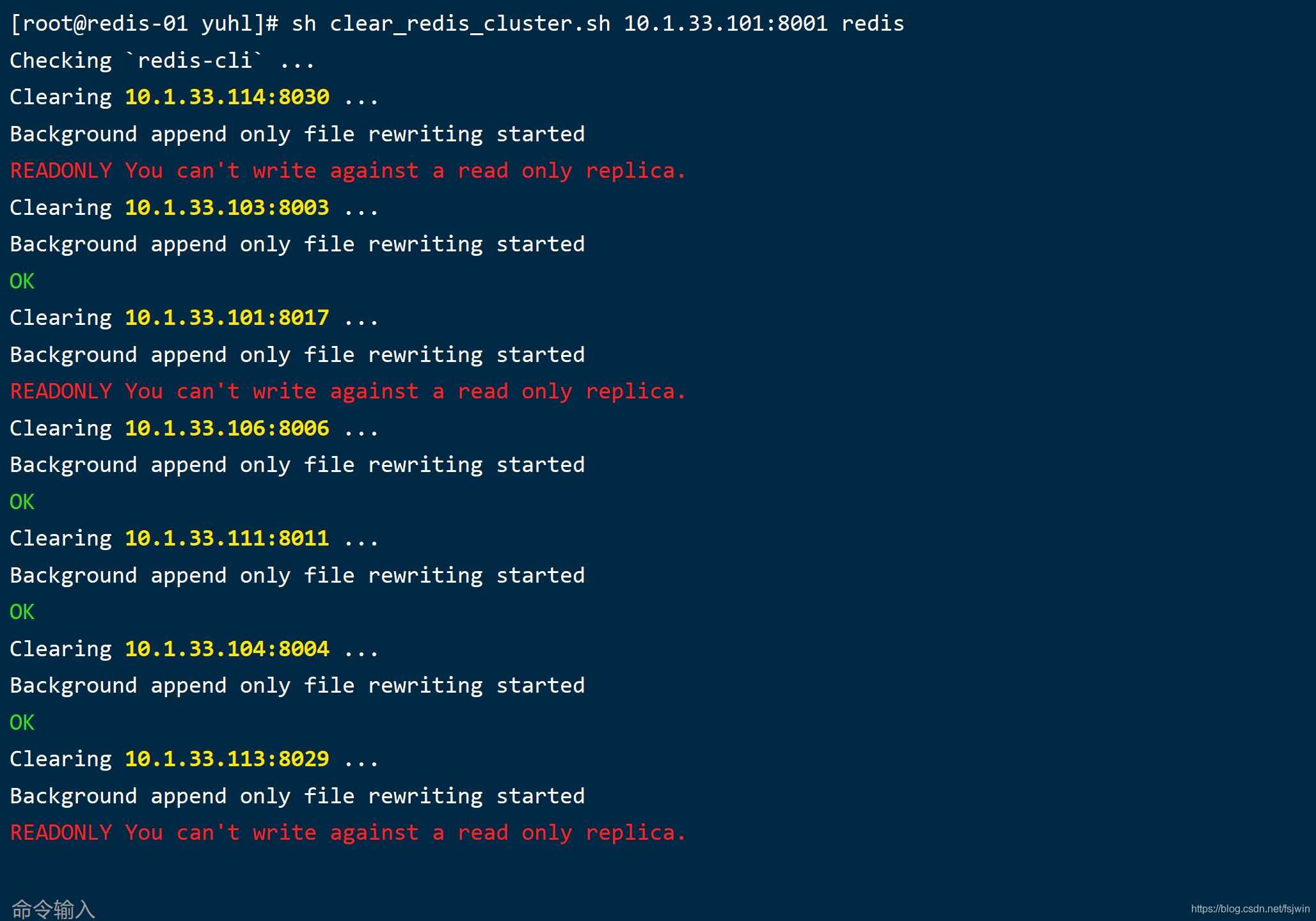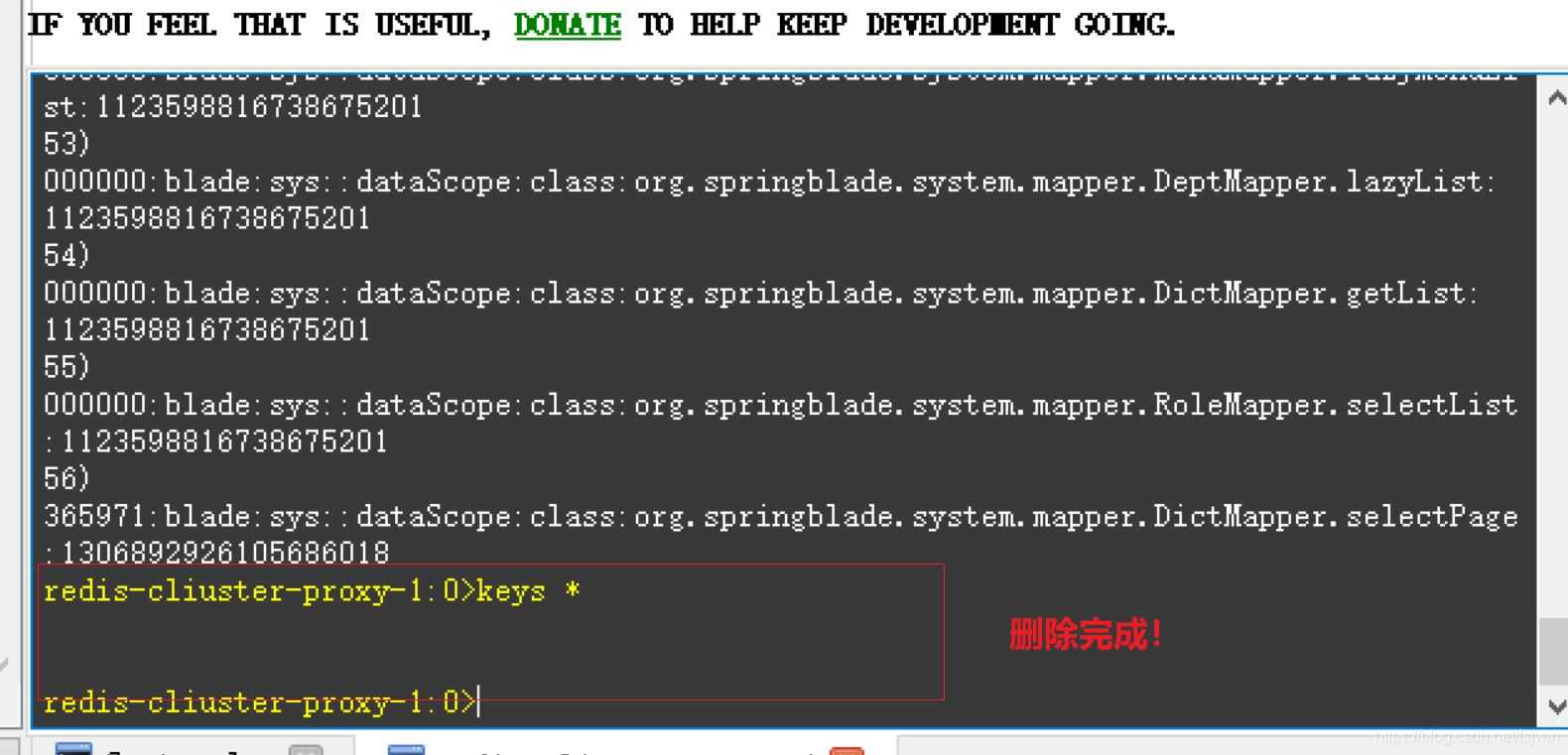详解如何清理redis集群的所有数据
1. 背景:生产测试后redis中产生大量数据
生产前需要清理reids集群中的数据。、
你看有很多key呢:
使用工具

使用命令,查看是否有数据:
keys *

2. 清理步骤
2.1 任意登录一台redis机器
执行下面脚本:
clear_redis_cluster.sh 10.1.33.101:8001 redis

执行日志如下:

Clearing 10.1.33.112:8028 …
Background append only file rewriting started
READONLY You can’t write against a read only replica.
Clearing 10.1.33.110:8026 …
Background append only file rewriting started
READONLY You can’t write against a read only replica.
Clearing 10.1.33.111:8027 …
Background append only file rewriting started
READONLY You can’t write against a read only replica.
Clearing 10.1.33.107:8007 …
Background append only file rewriting started
OK
Clearing 10.1.33.108:8024 …
Background append only file rewriting started
READONLY You can’t write against a read only replica.
Clearing 10.1.33.104:8020 …
Background append only file rewriting started
READONLY You can’t write against a read only replica.
Clearing 10.1.33.114:8014 …
Background append only file rewriting started
OK
Clearing 10.1.33.109:8025 …
Background append only file rewriting started
READONLY You can’t write against a read only replica.
Clearing 10.1.33.105:8005 …
Background append only file rewriting started
OK
Clearing 10.1.33.108:8008 …
Background append only file rewriting started
OK
2.2 clear_redis_cluster.sh内容
#!/bin/bash
# Writed by yijian on 2018/8/20
# Batch to clear all nodes using FLUSHALL command
# 用来清空一个redis集群中的所有数据,要求 FLUSHALL 命令可用,
# 如果在 redis.conf 中使用 rename 改名了 FLUSHALL,则不能执行本脚本。
# 可带两个参数:
# 1)参数1 集群中的任一可用节点(必须)
# 2)连接redis的密码(设置了密码才需要)
REDIS_CLI=${REDIS_CLI:-redis-cli}
REDIS_IP=${REDIS_IP:-127.0.0.1}
REDIS_PORT=${REDIS_PORT:-6379}
# 显示用法函数
function usage()
{
echo “Usage: clear_redis_cluster.sh a_redis_node_of_cluster redis_password”
echo “Example1: clear_redis_cluster.sh ‘127.0.0.1:6379′”
echo “Example2: clear_redis_cluster.sh ‘127.0.0.1:6379’ ‘123456’”
}
# 检查参数个数
if test $# -lt 1 -o $# -gt 2; then
usage
exit 1
fi
# 第一个参数为集群中的节点,
REDIS_NODE=”$1″
# 第二个参数为密码
REDIS_PASSWORD=””
if test $# -ge 2; then
REDIS_PASSWORD=”$2″
fi
# 取得IP和端口
eval $(echo “$REDIS_NODE” | awk -F[\:] ‘{ printf(“REDIS_IP=%s\nREDIS_PORT=%s\n”,$1,$2) }’)
if test -z “$REDIS_IP” -o -z “$REDIS_PORT”; then
echo “Parameter error: \`$REDIS_NODE\`.”
usage
exit 1
fi
# 确保redis-cli可用
echo “Checking \`redis-cli\` …”
which “$REDIS_CLI” > /dev/null 2>&1
if test $? -ne 0; then
echo “Command \`redis-cli\` is not exists or not executable.”
echo “You can set environment variable \`REDIS_CLI\` to point to the redis-cli.”
echo “Example: export REDIS_CLI=/usr/local/bin/redis-cli”
exit 1
fi
if test -z “$REDIS_PASSWORD”; then
redis_nodes=`redis-cli -h $REDIS_IP -p $REDIS_PORT cluster nodes | awk -F[\ \:\@] ‘!/ERR/{ printf(“%s:%s\n”,$2,$3); }’`
else
redis_nodes=`redis-cli –no-auth-warning -a “$REDIS_PASSWORD” -h $REDIS_IP -p $REDIS_PORT cluster nodes | awk -F[\ \:\@] ‘!/ERR/{ printf(“%s:%s\n”,$2,$3); }’`
fi
if test -z “$redis_nodes”; then
# Standlone(非集群)
if test -z “$REDIS_PASSWORD”; then
$REDIS_CLI -h $REDIS_IP -p $REDIS_PORT FLUSHALL ASYNC
$REDIS_CLI -h $REDIS_IP -p $REDIS_PORT BGREWRITEAOF
else
$REDIS_CLI –no-auth-warning -a “$REDIS_PASSWORD” -h $REDIS_IP -p $REDIS_PORT FLUSHALL ASYNC
$REDIS_CLI –no-auth-warning -a “$REDIS_PASSWORD” -h $REDIS_IP -p $REDIS_PORT BGREWRITEAOF
fi
else
# Cluster(集群)
for redis_node in $redis_nodes;
do
if test ! -z “$redis_node”; then
eval $(echo “$redis_node” | awk -F[\:] ‘{ printf(“redis_node_ip=%s\nredis_node_port=%s\n”,$1,$2) }’)
if test ! -z “$redis_node_ip” -a ! -z “$redis_node_port”; then
# clear
echo -e “Clearing \033[1;33m${redis_node_ip}:${redis_node_port}\033[m …”
if test -z “$REDIS_PASSWORD”; then
result=`$REDIS_CLI -h $redis_node_ip -p $redis_node_port FLUSHALL ASYNC`
$REDIS_CLI -h $redis_node_ip -p $redis_node_port BGREWRITEAOF
else
result=`$REDIS_CLI –no-auth-warning -a “$REDIS_PASSWORD” -h $redis_node_ip -p $redis_node_port FLUSHALL ASYNC`
$REDIS_CLI –no-auth-warning -a “$REDIS_PASSWORD” -h $redis_node_ip -p $redis_node_port BGREWRITEAOF
fi
if test ! -z “$result”; then
# SUCCESS
if test “$result” = “OK”; then
echo -e “\033[0;32;32m$result\033[m”
else
echo -e “\033[0;32;31m$result\033[m”
fi
fi
fi
fi
done
fi
这位仁兄的脚本写的特别好。直接执行即可。
2.3 确认删除成功
使用redis工具查看:

3.清理单机redis
flushall
4.总结
使用脚本删除redis集群中的数据。
记得地址哦:
https://github.com/eyjian/redis-tools/blob/master/clear_redis_cluster.sh
到此这篇关于详解如何清理redis集群的所有数据的文章就介绍到这了,更多相关清理redis集群数据内容请搜索以前的文章或继续浏览下面的相关文章希望大家以后多多支持!

